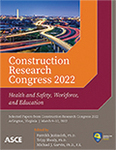Students’ Perception of Instructional Delivery Methods Utilizing Various Teaching Modalities in an Integrated Construction Management Curriculum
Publication: Construction Research Congress 2022
ABSTRACT
This paper discusses students’ perspectives about the instructional delivery methods they prefer and find most effective in an integrated construction management curriculum at a major university. Utilizing a spiral learning (SL) framework, integrated project-based laboratories have been designed to complement and enhance student learning throughout the curriculum, providing opportunities for students to build and perform experiential lab activities by applying knowledge first learned through various methods of instruction; students then build upon that knowledge in each successive course. Instructional delivery methods are examined through a student survey on their perceived effectiveness and preferences through various instructional modalities including asynchronous, virtual synchronous, face-to-face, and a hybrid. With a 95% confidence interval and a 7.8% margin of error, 65% of students both preferred and found hands-on building and lab activities to be most effective over all other instructional delivery methods. These results were consistent across all delivery modes in all courses with a problem-based learning component within the SL construction management curriculum.
Get full access to this article
View all available purchase options and get full access to this chapter.
REFERENCES
Barlow, P. L. (2011). Development and delivery of an integrated project-based jobsite management undergraduate course. Associated Schools of Construction International Proceedings of the 47th Annual Conference, 3–21.
Berhnart, B., Cabral, J., Hubbard, B., Metzinger, J., Morgan, P, and Santon, S. (2017). Construction management curriculum transformation through project-based learning; Part 1 of a progressive case study. Associated Schools of Construction International Proceedings of the 53rd Annual Conference, 19–27.
Chinowsky, P. S., Brown, H., Szajnman, A., and Realph, A. (2006). Developing knowledge landscapes through project-based learning, Journal of Professional Issues in Engineering Education and Practice, 132(April), 118–124.
Cleary, J., and Starzyk, G. (2020). Case study: Constructivist learning following an interdisciplinary studio for an NGO. Associated Schools of Construction International Proceedings of the 56th Annual Conference, 161–169.
Davis, K., and Cline, R. (2009). Improving course comprehension through experiential learning. Construction Research Congress 2009: Building a Sustainable Future, 339, 1409–1418.
Farrow, C. B., Liu, J., and Tatum, M. C. (2011). Curriculum delivery and assessment for net generation construction students. International Journal of Construction Education and Research, 7(November), 109–125.
Frank, M., Lavy, I., and Elata, D. (2003). Implementing the project-based learning approach in an academic engineering course. International Journal of Technology and Design Education, 13(3), 273–288.
Greenwood, P. B., Janke, D., Donegan, L., and Schwab, K. (2017) More than a motto: The meaning behind Cal Poly’s learn by doing signature, California Polytechnic State University.
Gunderson, D. E., and Moore, J. D. (2008). Group learning pedagogy and group selection. International Journal of Construction Education and Research, 4:1, 34–45.
Jaime, A., Blanco, J. M., Domínguez, C., Sánchez, A., Heras, J., and Usandizaga, I. (2016). Spiral and project-based learning with peer assessment in a computer science project management course. Journal of Science Education & Technology, 25(3), 439–449.
Kelting, S. (2011). Students’ perspectives about a delivery system for a residential construction management course. Associated Schools of Construction International Proceedings of the 47th Annual Conference.
Kelting, S., and Hauck, A. (2010). Project-based delivery system for an integrated residential construction course. Associated Schools of Construction International Proceedings of the 46th Annual Conference.
Kelting, S., and Holt, E. A. (2012). The development of an integrated residential construction management course. American Society for Engineering Education Proceedings of the 2012 Annual Conference.
Kolegraff, S. A., Cleary, J., and Kline, A. (2021). Student perceptions of instructional delivery methods utilizing various teaching modalities in an integrated lab curriculum. Associated Schools of Construction International proceedings of the 57th Annual Conference, 496–504.
Kolegraff, S., Kline, A., and Kelting, S. (2019). Hands-on building as an instructional delivery method in an integrated lab curriculum. Associated Schools of Construction International proceedings of the 55th Annual Conference, 33–40.
Kumar, P., Kumar, A., and Smart, K. (2004). Assessing the impact of instructional methods and information technology on student learning styles. Issues in Informing Science and Information Technology, 1, 0533–0544.
Maghiar, M., Sturges, D., Maurer, T., and Jackson, M. (2015). Exploration of student perceptions, behaviors and academic performance in construction management classes. International Journal of Construction Education and Research, 11(4), 241–256.
Montoya, M., Kelting, S., and Hauck, A. (2009). Pilot Study of an integrated construction management curriculum. Associated Schools of Construction International Proceedings of the 45th Annual Conference, 59–66.
Pratt, D. (1998). Five Perspectives on teaching in adult and higher education, Krieger Publishing Company, Malabar, FL.
Rokooei, S., and Ford, G. (2019). Comparison of industry and students’ perceptions in a studio-based construction program. Associated Schools of Construction International Proceedings of the 55th Annual Conference. 17–25.
Veladat, F., and Mohammadi, F. (2011). Spiral learning teaching method: Stair stepped to promote learning. Procedia - Social and Behavioral Sciences, 29(ICEEPSY 2011), 1115–1122.
Yildirim, S. G., Baur, S. W., and LaBoube, R. A. (2014). Fundamentals of framing construction in architectural engineering; a hands-on learning experience. Midwest Section Conference of the American Society for Engineering Education.
Information & Authors
Information
Published In
History
Published online: Mar 7, 2022
Authors
Metrics & Citations
Metrics
Citations
Download citation
If you have the appropriate software installed, you can download article citation data to the citation manager of your choice. Simply select your manager software from the list below and click Download.
